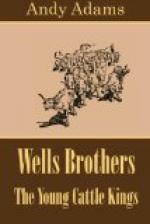“That’s different,” admitted Mr. Stoddard. “Don, if you’ll suggest the means to that end, I’ll try and meet you halfway.”
Mr. Lovell took a seat at the table and picked up a blank sheet of paper. “As mutual friends,” said he, “let me draw up, from seller to buyer, an iron-clad bill of sale. Its first clause will be a vendor’s lien for the cost of the cattle, horses, etc. Its second will be the appointment of a commission house, who will act as agent, hold this contract, and receive the beeves when ready for shipment to market. Its third clause will be your right, as creditor in a sale of chattel, to place a man of your own selection on Wells Brothers’ ranch, under their pay and subject to their orders. As your representative, the privilege is granted of making a daily, weekly, or monthly report to you of the condition of the cattle and the general outlook of the buyers to meet this, their covenant with the seller, before November 1, 1887.
“I wouldn’t enter into such a contract with you,” continued Mr. Lovell, throwing down the sheet of paper, “but I want this boy to learn the value of a well-protected credit. At his time of life, it’s an asset. I’ll pay for my half when it’s convenient, but I want him to meet his first obligation on or before the day of maturity. I can speak for the boy’s willingness to make such a contract. What do you say?”
“Delivery here or elsewhere?” inquired Mr. Stoddard.
“My half here, within three days, the remainder on the Beaver, a seven days’ drive. It won’t cost you a cent more to send your outfit home from Grinnell than from Dodge. Ten days will end all your trouble. What do you say?”
“Don, let me talk the matter over with you privately,” said Mr. Stoddard, arising. “The boy will excuse us. We’ll give him a square deal.”
The two old men left the room. Forrest arose from a couch and threw his arms around Joel. “It’s a sale!” he whispered. “The cattle’s yours! That old man of mine will ride Dud Stoddard all around the big corral and spur him in the flank at every jump, unless he comes to those terms. An iron-clad bill of sale is its own surety. You’ll need the man, anyhow. I want to give the long yell.”
Mr. Lovell returned after midnight, and alone. Forrest and Joel arose to meet him, inquiry and concern in every look and action.
“Take Joel and get out of here,” said the old drover, whose twinkling eyes could not conceal the gloating within. “I’ve got to draw up that bill of sale. Just as if those steers wouldn’t pay for themselves next fall. Get to bed, you rascals!”
“Would there be any harm if I went down to the bank of the river and gave the long yell?” inquired Forrest, as he halted in the doorway.
“Get to bed,” urged the old drover. “I’ll want you in the morning. We’ll close a trade, the first thing, on fifteen hundred of those Womack twos. That’ll give you a herd, and you can keep an eye over Joel’s cattle until the Beaver’s reached.”




